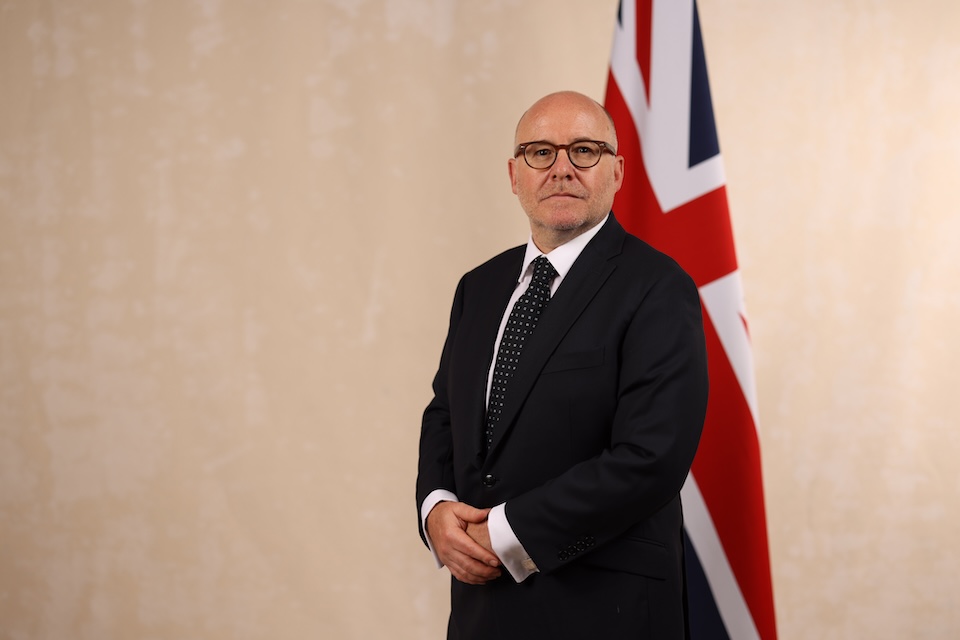Introduction
Good afternoon, I am delighted to be here with you.
I’d like to thank the Beacon Collaborative for bringing us together today, helping us think with many minds on one, urgent challenge how to grow the value and impact of philanthropy in our nations and around the world.
It is apt that we are meeting here at Guildhall, a place that speaks to the close relationship between commerce and charity in this city. The City Bridge Trust, administered by the Corporation of London, based here at Guildhall, made grants worth £30m to charities across the capital last year alone. Over the same period, the Lord Mayor’s Appeal, which works to encourage philanthropy in the city spent over £3m on projects designed to strengthen communities and cohesion across London.
These initiatives recognise and reflect a key facet of the social contract in this country.
Namely that with privilege and good fortune come responsibility. Our hosts, the Beacon Collaborative, put this in simple terms “Our economy offers the freedom to create great wealth, but with reward must come responsibility.”
That responsibility is not about sacrifice or denial. It is based on an understanding that we are all part of a wider community, an ecosystem of mutual dependence and support, on whose cohesion the success of our society – and all individual wellbeing – ultimately rests.
A challenging sector landscape
The Charity Commission stands at a unique vantage point, where the perspectives of charities, government, the public and donors meet.
From this position, we see two trends.
First, an incredibly challenging economic environment for the sector.
Like other sectors, charities face inflationary pressures and rising operational costs.
But charities are also dealing with increased demands for their services.
And at the same time, public funding sources in particular are increasingly squeezed.
The cumulative impact of these trends on charities is, in some cases, extremely challenging.
Take arts and culture, a particular passion of mine. Between 2010 and 2023, grant in aid funding for UK arts and cultural organisations fell by 18%. Local government revenue funding of culture and related services have also decreased by 48% in England, and 40% in Wales.
It’s important to acknowledge that these cuts have come amid very challenging public finances, with tough choices having to be made. But the impact on the sector is undeniable.
Other sub-sectors are especially vulnerable, too.
Last summer, we learnt that one in five hospices in the UK have cut or closed their services in the last year or are planning to do so.
In October, Getting on Board, which for twenty years played a crucial role in encouraging new talent into trusteeship, announced it could no longer continue to operate.
The case for philanthropy
Our second observation, though open to some debate, is a perception that high-net worth philanthropy has declined in recent years.
To be clear, the UK remains, according to some but not all measures, among the most generous group of nations on the planet, funding a thriving and vibrant charitable sector.
In total, charities in England and Wales last year managed over £90 billion in annual income. The contribution of charity and voluntary organisations as a percentage of GDP is greater, according to some measures, than the entire agricultural sector of the UK.
But the proportion of those giving seems to be falling.
For some years, The Charities Aid Foundation – who fulfil such a valuable role in producing research about the sector, and of course in supporting occasions such as this – have published reports pointing to a declining number of donors.
CAF’s latest report finds that, while the overall value of giving is holding up in real terms – in 2023 people donated at least £13bn to charity – fewer people are giving.
Separately, there is evidence suggesting that the top one percent of asset owners and earners in our country give less than their counterparts in equivalent societies, such as New Zealand and Canada. Some have suggested that there is a £5 billion gap between giving in the UK and in those two countries.
Previous research has indicated an overall decline in the value of donations by the top one percent of earners, despite increases in their income. And the latest UK giving report, just mentioned, finds that that some of the least affluent parts of the UK are among the most generous.
In summary, by a number of metrics, it seems likely that while charitable giving is just about holding up, high net worth philanthropy is proving less robust.
The potential of philanthropy
But this challenging context provides for a once-in-several generations opportunity.
For while there may be huge challenge, there is also huge potential, right now, for a new era of philanthropy to tackle our most intractable social challenges. We have the opportunity to resource and re-ignite the potential of our communities, through a renewed collaborative approach between our amazing charitable sector, corporate donors, philanthropists, communities and government.
The potential of philanthropy lies not just in the immediate financial boost it might offer the individual charities.
But in the agility and flexibility, the innovation and creativity it can encourage, inspire and unleash.
I think, as a nation, it is time to re-embrace the long and proud history of philanthropic impact, revive it, unleash it and celebrate it for our times.
I speak from personal experience as to the benefits philanthropy can bring.
I grew up in Liverpool in the 1980s. The city was then in post-industrial decline, and it felt in many ways forgotten and neglected by many. It had, arguably, lost its sense of purpose.
Today my home city is transformed. And that transformation happened through a combination of philanthropic investments, national and local government investment, alongside renewed community action notably in the arts, culture and tourism which acted as catalysts for wider renewal.
Financial and cultural investment in Liverpool in turn led to an expansion in higher education provision, an influx of international students and therefore an increasingly skilled workforce.
Liverpool is now in the process of a next phase of transformation. National non-governmental bodies have moved their HQs to the city, and life science industries are investing. Things are moving and changing thanks to that initial spark provided through philanthropy.
It shows that philanthropy and charity is ever evolving and finding new models, new ways to deliver real and lasting impact. That philanthropy and charity are not just about handouts, but hand-ups and start-ups, with the power to unleash peoples’ and communities’ potential.
To return to arts and culture, a sector that is now highly reliant on major gifts and sponsorships.
The Donmar, for example, lost its council funding in 2022. Now, any work that is not revenue generating must have its costs covered by fundraising. Corporate sponsorship has stepped in and is helping to ensure that the Donmar can continue to invest in its talent development programmes – providing paid traineeships to those underrepresented in the arts industry – and its community work in Camden and Westminster, offering free engagement programmes to over 5,000 young people every year.
Great charitable work, only possible now thanks to philanthropy.
Of course, philanthropy alone cannot make a city or a community, or reverse a social ill. But it can act as a spark that re-ignites hope and confidence and gives a community the confidence to revive itself, and to unleash its potential to adapt to changing economic, political and social circumstances.
The mechanisms for this particular role of philanthropy are varied.
First, philanthropists can do what other funders – notably public sector funders – cannot.
They can take risks and innovate, work out new solutions to deep-rooted problems by trying and testing.
They can support charities’ core costs, helping them develop long-term viability and stability, rather than living only from one grant to the next.
And philanthropists can sow seeds – offering large, one-off donations that allow new charities to get off the ground, or established charities to plan for the long term.
Celebrating philanthropy
So again, whilst there are challenges, there is much to recognise and celebrate.
For example, I am moved to see corporate philanthropy combine with public generosity, community campaigning, media engagement and political interest – as well as support from the Charity Commission – to breathe new life into Zoe’s Place in Liverpool.
The charity provides end of life hospice care to babies and young children, bringing children and their families comfort and relief in incredibly challenging circumstances. It had faced closure in Liverpool, due to the spiralling costs of new accommodation.
Together, campaigners raised £6m in a month before Christmas, allowing the charity to continue.
It was an amazing effort, that would not have been possible without philanthropic contributions.
Similarly, I am deeply impressed with the work of the Moondance Foundation. Founded in 2010 by Diane and Henry Engelhardt, the charity has given away a remarkable £145 million, most of which has gone to support and strengthen communities in Wales, which is the family’s chosen, adoptive home. In December last year, we visited small community organisations in Port Talbot, Swansea, and Bridgend that have all benefited from this extraordinary generosity.
Their example shows that love of a place, responsibility and commitment to a community is a matter of heart, not necessarily heritage.
I would also like to mention here the work of the late Julia Rausing, who sadly passed away last year, leaving an immense legacy of generosity and kindness. She was an example to others, not just in how much she helped give away, but how – her sense of urgency and oversight ensured funds, where needed, were swiftly dispatched and carefully accounted for.
Or the musician Stormzy, who has given back of his wealth and influence to promote education and opportunity among young people.
And I must mention the Commission’s own board member Rory Brooks, who recently donated £2m to the Global Development Institute at The University of Manchester. He will not thank me for including his example here, but in his absence, Rory – if you want to promote philanthropy, you must let us celebrate your own example.
The Commission’s ongoing commitment to promoting philanthropy
I know many in the philanthropy world have been wondering what Orlando’s departure as Chair later this year means for our work in this area.
First, I would like to acknowledge the significant contribution Orlando has made to public discourse on philanthropy during his time in office.
Orlando has used his authority and his voice as Chair of the Charity Commission to ensure philanthropy is seen and understood as one of the solutions to the urgent issues of our day.
And he has made a compelling case for the responsibilities and opportunities the Commission has to convene public debate on this issue.
So I know many in the world of philanthropy and beyond are very sorry to see Orlando move on from the Commission.
But let me make very clear.
The work he began will continue.
I, and the Commission’s Board, are determined to deliver on the commitment made in our corporate strategy to encourage trusteeship and amplify donor and philanthropic confidence through our work.
I am bound by them, not just by professional duty, but by personal conviction. A regulator must enable, encourage, unleash as well as enforce.
I am grateful to Rory Brooks, as I’ve mentioned a remarkable philanthropist in his own right, who as a member of the Commission’s board is spearheading much of this work.
Rory’s diligent commitment over the past two years has borne much fruit.
I am convinced that his quiet powers of persuasion have contributed to a changing public discourse on philanthropy.
A renewed understanding, on all sides of the political divide, that private wealth, voluntarily given, is part of the solution to some of the most entrenched of our social ills.
The new government has demonstrated its interest in philanthropy, particularly in geographical areas that are struggling to attract funding. We heard earlier from Minister Peacock about the government’s commitment to producing a place-based philanthropy strategy, more details of which we expect to hear about over the coming months.
The Commission’s role and work
But for our own part, what are we collectively doing at the Commission to promote philanthropy?
Promoting the UK as a great place to give
First, we have a role in ensuring, and demonstrating, that the UK remains among the best and safest places to give.
We have a robust, long-established regulatory infrastructure, which ensures transparency – not least through the accounting framework – and which gives donors confidence that there is oversight over the funds that charities receive.
That infrastructure stretches beyond the work of the Commission alone – other principal regulators, such as the Department for Culture Media and Sport and the Office for Students, play an important role in regulating vital sub-sectors in the field of culture, arts and heritage, as do auditors and independent examiners working to regulatory requirements.
In that context, the UK is also a centre of excellence for professional services – we boast among the best lawyers, financial advisors and wealth managers in the world.
There is room for more active input from these professionals in promoting philanthropy.
In the legal world, especially, there is an opportunity for those advising on transactions involving significant assets to actively introduce and encourage philanthropic considerations.
But overall, the system we have in place means philanthropists from all over the world, can have confidence in investing their goodwill and generosity into UK based charities – many of which, of course, operate globally.
Supporting charities to improve governance
Second, we help trustees understand their legal duties and sustain and improve their charities’ governance.
Last year, we published guidance supporting trustees to make the right choices on accepting, refusing and returning donations. That guidance reflected the law in being explicit about the starting point that charities should accept donations.
It is for trustees to make decisions as to what is in their charity’s best interests. Sometimes, trustees may well conclude that they should not accept a philanthropist’s support. But we wanted our guidance to be clear that the law assumes donations to charities to be generally a good thing.
We wanted to support trustees to say yes to donations where, having carefully weighed up the relevant factors, it is in their charity’s best interests – even where it might be contentious or controversial for some.
And I think that reminder is salutary at the present time, given the challenging financial context I set out earlier.
The last thing I want to see on my watch at the Commission is charities – including world leading arts and cultural organisations which have long benefited from philanthropic generosity – finding they can no longer operate successfully, because donations are withheld for fear of being rejected.
So I encourage those giving – whether individual philanthropists or corporate donors – to continue to do so even when there may be those who disagree with such donations from a point of personal principle or conviction. It is the benefit of democracy that we can disagree while still each exercising our individual freedoms and still do good for charity, our communities and those most in need.
To help enable this, we hope our guidance will inform a giving culture, but also a receiving culture, that allows for constructive discussion in the best long term interests of charity.
Delivering data-led insights
Thirdly, the Commission maintains, to our knowledge, the most complete and comprehensive charity data set anywhere in the world. Although this presents its own challenges, we’re also keen to recognise the opportunities for collaboration with partner organisations.
Over the last 18 months, Rory has led two summits focusing on the Commission’s data, our ongoing digital projects, and how we plan to help the sector make more informed funding decisions.
I know, for instance, the impact that digitisation of charity accounts will have for those working with charity data and that is why it remains such a priority for us.
These summits give us fascinating insights into how the philanthropy sector uses, and would like to use, charity data. In the near future we will see an early outcome of this work, with new data drawn from charities’ annual returns on the value of their single largest donation received during that year.
This data over time will not just provide useful insights in to trends in philanthropy, but will, I hope, serve as inspiration to existing and potential philanthropists to give with heart and confidence.
Convening role, working with government
A final aspect of the Commission’s role that I am especially keen to promote is that of convenor.
We have a unique ability to help bring together the sector, government, philanthropists and donors as well as experts such as our hosts Beacon and the Charities Aid Foundation to consider, together, how we can encourage those with great wealth to choose the UK as a place to leave a legacy.
It has begun with the work I mentioned on data, but we want to go further and identify other focus areas, bringing together those with the passion and capability to drive progress. Specifically, we are keen to continue to work alongside other players to support government and other policy makers to ensure giving is incentivised and celebrated.
Conclusion
So in conclusion, despite the challenges, I believe we have a generational opportunity to revive and reignite our proud history of philanthropic giving for a modern age.
To build on the many recent examples of joined up action, be it placed-based or issue-based, which sees philanthropy, community, business, media, politicians come together to unleash potential, solve issues or spark renewal.
It is the power of that collective action, that joined-up approach to today’s challenges, that this generation of philanthropists and charities can use to continue to achieve the seemingly impossible, to improve the lives of many and unleash the spark of hope, innovation and opportunity.
As the CEO of the Commission I promise you we will be there beside you, playing our part, enabling you to do the amazing things you do for the benefit of society.
We at the Commission will also help ensure that this growing band of philanthropists feel proud of their achievements, and use our platform to shout about them – encouraging others to follow suit. So to all of you who give, to those professionals that advise and support giving – thank you – never under-estimate the impact you have – and the opportunity you enable.
Thank you.








